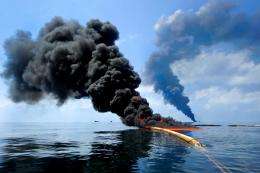The great Gulf oil spill: Stanford experts explain what went wrong

(PhysOrg.com) -- How could it happen? The details of the Deepwater Horizon disaster will be thrashed out in a public talk Tuesday evening by three Stanford experts: geophysicist Mark Zoback, Law School lecturer Meg Caldwell and energy engineer Roland Horne.
In the aftermath of the Deepwater Horizon disaster in the Gulf of Mexico, Stanford geophysics professor Mark Zoback says the national conversation should be more than hyperbole and hand-wringing.
"We can do better than simply damning BP or damning the oil industry or damning technology and our (lack of) ability to regulate it," Zoback said.
"I think deepwater oil and gas reservoirs can be exploited safely," he said. "But I think there has to be closer collaboration between the companies and the government."
Zoback, a member of the committee formed at the request of Interior Secretary Ken Salazar to investigate the disaster, is one of three Stanford faculty members who will discuss the disaster on Tuesday, Nov. 30, at 7:30 p.m. in the auditorium of the William R. Hewlett Teaching Center, 370 Serra Mall, Stanford campus.
The event, "The Deepwater Horizon Disaster and the Future of Drilling in the Gulf of Mexico," is free and open to the public.
Meg Caldwell, senior lecturer in law and executive director of the Center for Ocean Solutions, will also speak, focusing on the important ecological attributes of the Gulf of Mexico, environmental impacts of the disaster and recommendations for regulatory reform. The Center for Ocean Solutions is a collaboration among Stanford, the Monterey Bay Aquarium, and the Monterey Bay Aquarium Research Institute.
"The Deepwater Horizon disaster presents an opportunity for us to examine systemic weaknesses in our offshore oil and gas regulatory framework and address them head-on," said Caldwell. "We must learn from this debacle and commit to fix the problems that lead to it."
Questions from the audience will be welcomed after the two 30-minute talks, when Zoback and Caldwell will be joined by Roland Horne, a professor in the Department of Energy Resources Engineering, for a panel discussion. A video of a Nov. 16 public lecture by Horne on the technical causes of the Deepwater Horizon accident is available online.
Along with Zoback, Stanford engineering professor Elisabeth Pate-Cornell is one of the 15 members of the committee established by the National Academy of Engineering and the National Research Council at Salazar's request.
The committee issued a preliminary report on Nov. 17 in which it explored the causes of the disaster. The final report, due in June, is to include recommendations on how to prevent future accidents, which Zoback said is likely to be the hardest part of the job.
"We will be looking at other regulatory systems around the world," he said, "and then try to figure out how they might be implemented here in the U.S. to provide an additional measure of public safety."
Zoback said that in the last nine years, 2,000 wells were drilled in the Gulf of Mexico in water depths greater than 1,000 feet. Altogether, almost 9,000 deepwater wells have been drilled.
Out of all those wells, he said, "We have had one serious accident."
"Normally, operational practice is sufficient that when surprises come along or mistakes are made, they are addressed appropriately. But the Deepwater Horizon accident indicates that that is not always the case," Zoback said.
"I think we have to look at establishing a new context for how these kinds of projects are regulated."
Provided by Stanford University




















